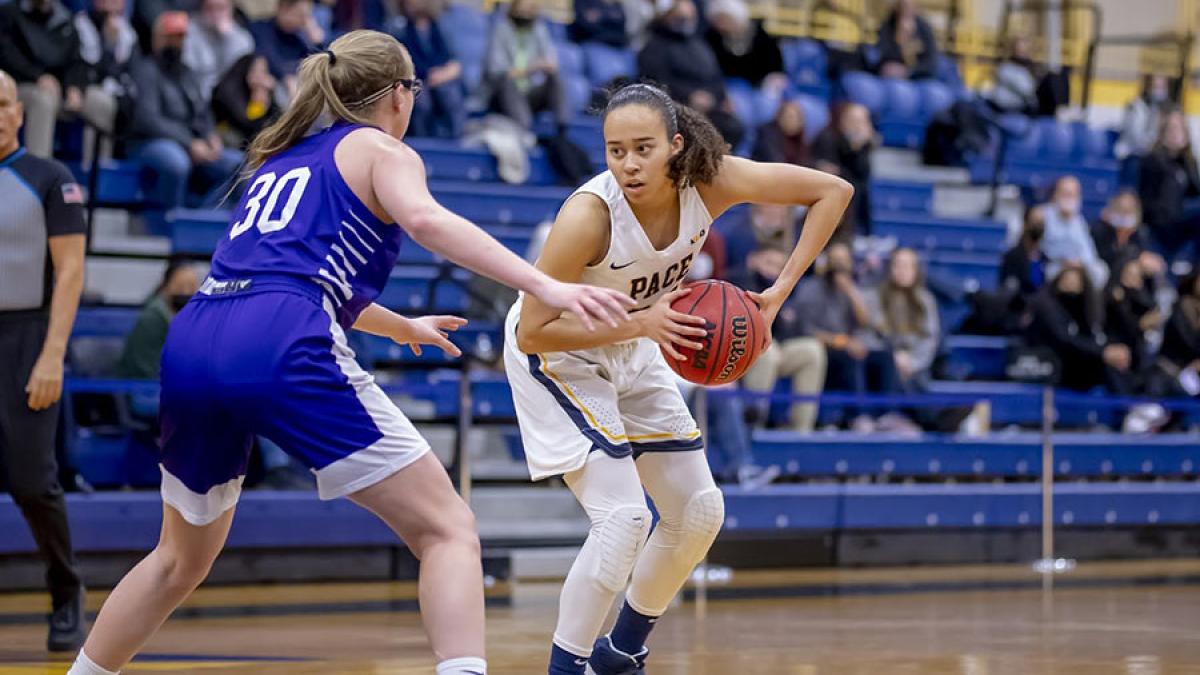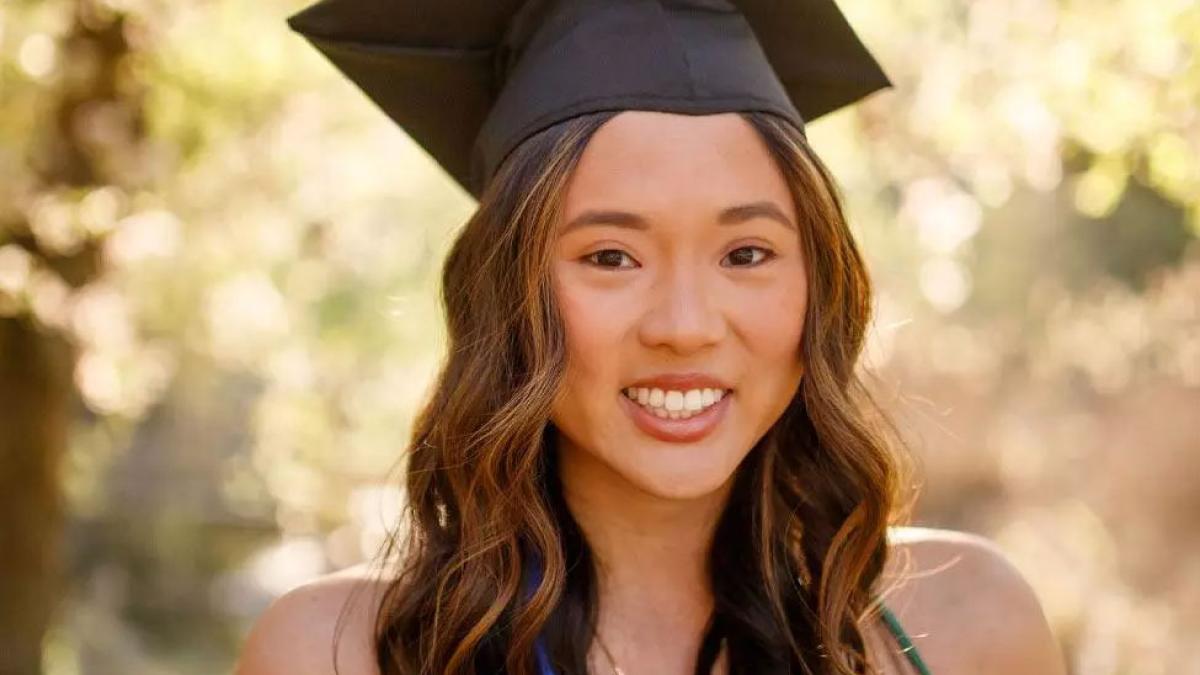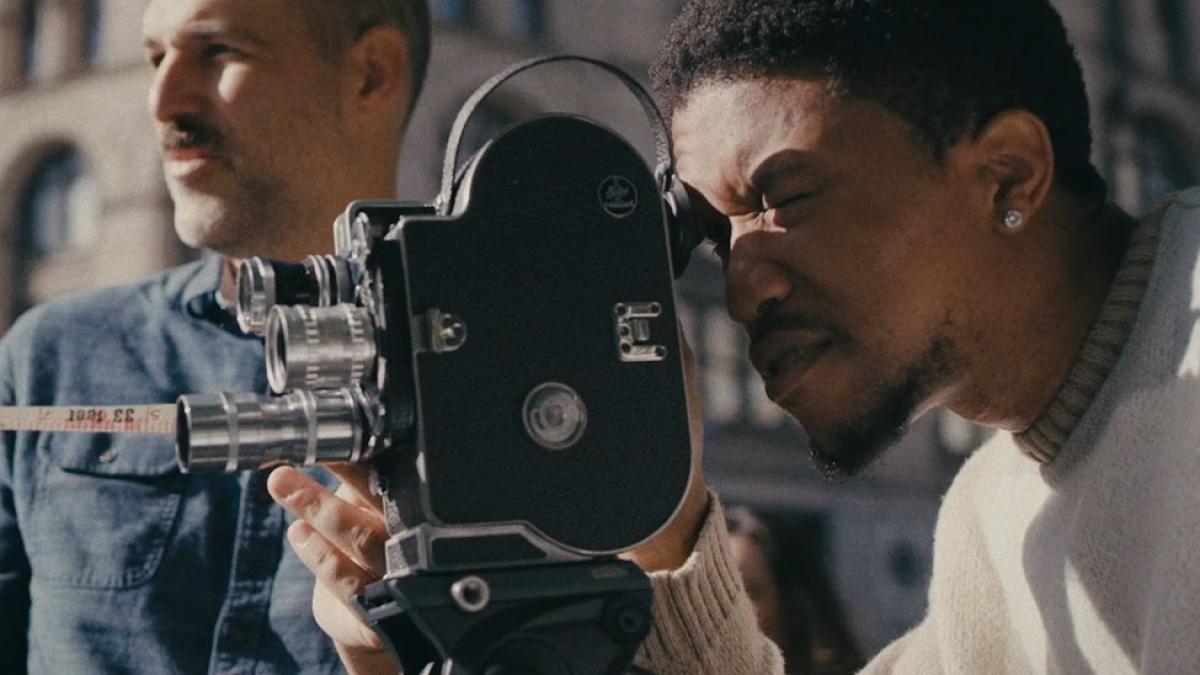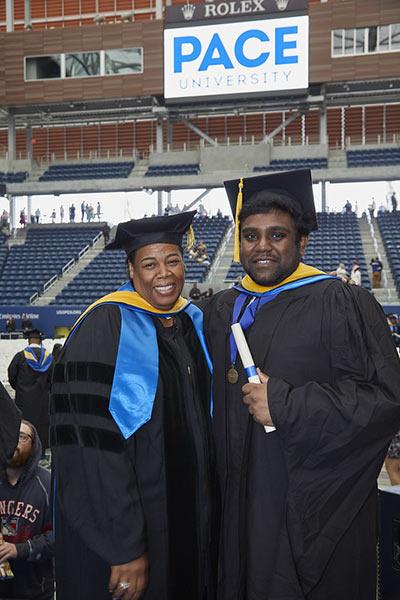
Pace University constitutional law professor discusses overturning Roe V. Wade
Pace University Professor Emily Gold Waldman, who teaches constitutional law, joins News 12 via ZOOM to discuss the ramifications of overturning Roe V. Wade.
It's Time To Expand Public Service Loan Forgiveness
As debates continue about how to solve the student loan crisis in our country, one federal program with significant benefits doesn’t get enough attention. The Public Service Loan Forgiveness Program was created in 2007 to help federal student loan borrowers who choose to go into nonprofit or governmental careers, which typically pay less than jobs in the for-profit sector.
Making Accounting Click
After graduating from the Lubin School of Business with her BBA, Christal Wong kept the momentum going and is now gearing up to graduate with her MBA in Public Accounting in May 2022. After juggling competitive sports, internships, and working on the Pleasantville campus, Christal now has a full-time job waiting for her at PwC.


Christal Wong
Senior Associate, PwC
Class of 2022
BBA/MBA in Public Accounting
After graduating from the Lubin School of Business with her BBA, Christal Wong kept the momentum going and is now gearing up to graduate with her MBA in Public Accounting in May 2022. After juggling competitive sports, internships, and working on the Pleasantville campus, Christal now has a full-time job waiting for her at PwC starting in January 2023.
Why did you choose Pace University and the Lubin School of Business?
I chose Pace University because it allowed me to continue my passion of playing volleyball competitively. I also love that the class sizes are smaller than other universities, so I have a better chance of developing stronger relationships with my professors and peers. Alumni relations, networking events, and career resources made Pace and Lubin very attractive to me, as well. The campus is also beautiful and the plethora of study rooms incentivized me to sit down and utilize the tools to prepare for my tests.
After receiving your BBA from Lubin, you decided to return for your MBA in Accounting. What inspired you to continue your education at Lubin?
Initially, I was only going to pursue a bachelor's degree and graduate in 4 years, but I saw how great Lubin's combined BBA/MBA program was and figured I might as well get my masters, especially if I needed 150 credits to become a certified public accountant (CPA). I haven't decided my endgame yet but having a master's degree and being a CPA could open more doors for me in the future. My parents, who learned English as a second language, both achieved their bachelor's degrees, which inspired me to go above and beyond since they gave me the opportunity to aim higher. I want to show them that they did a good job raising me.
Not only are you a public accounting student, but you are also an accounting tutor on campus. Why was it important for you to get involved to help your peers better understand accounting?
I remember struggling with my classes when I first started out and then having several "aha" moments after either sitting by myself, staring at a textbook for hours, or with the help of a tutor or professor. I want to be able to help others reach that "aha" moment sooner and to provide them with another resource to succeed, so they don't feel like they're alone. Since I had people there to help me, I want to pay it forward and help others who may be struggling or just need some additional support. Having a mentor or role model helps students gain confidence to get through whatever challenge they are facing at the moment.
You were a member of the Pace University volleyball team. What did you learn from being on a team?
Being a member of a sports team improved my communications skills and showed me the importance of being a team player. It helped me become more responsible—I had to balance my priorities and practice time management to do well on and off the court. I also learned the importance of working with those from different backgrounds and setting aside differences to achieve a common goal. Being on the team made me a more confident and mentally strong person.
On top of being a student-athlete, you also held internships at PepsiCo and PwC and worked on campus as a PaceFit employee, student assistant, and accounting tutor. You are also the recipient of Lubin's Scholastic Achievement Award. What motivates you to work hard?
What motivates me to work hard is definitely my parents and making them proud. They are immigrants from China working to provide my brother and me with more opportunities. Seeing how hard they work inspires me to do the same. I have a lot of support from my friends, family, and Lubin faculty, so I don't want to let them down. I also naturally like to keep myself busy and challenge myself. I have always felt like an underdog, so I like proving to myself and others that I can do whatever I set my mind to if I work hard enough, which hopefully shows other underdogs that they can do it too.
Do you have any advice for other Lubin students?
Take advantage of all the resources provided by Pace University and Lubin. Be proactive in furthering your career and expanding your network. There will times where you are stressed, confused, or overwhelmed, but just try to do your best. Everything has a funny way of working out in the end. Making connections and having a good support system will make a huge difference in your time at the university.
Take advantage of all the resources provided by Pace University and Lubin. Be proactive in furthering your career and expanding your network. Making connections and having a good support system will make a huge difference in your time at the university.
What does #LubinLife mean to you?
To me, #LubinLife means being open-minded and willing to learn and absorb new information. It means putting yourself out there and moving out of your comfort zone by engaging with other members of the community to continue growing as a professional and individual.
Do you have any post-graduation plans that you would like to share?
I plan on passing the remainder of the CPA parts by the end of 2022 and traveling as much as possible before working full-time at PwC starting in January of 2023. I want to learn Mandarin, as well. I plan on being a mentor and will probably be back at Pace once in a while to provide advice and answer questions.
Connect with Christal:
Instagram: @christahhhl
LinkedIn: Christal-Wong
Celebrating Commencement 2022
On Monday, May 16, Pace will hold the largest Commencement ceremony in our history to celebrate the classes of 2020, 2021, and 2022 at the USTA Billie Jean King National Tennis Center. Here's what you need to know about schedules, student speakers and award winners, food, photos, and so much more.


On Monday, May 16, Pace will hold the largest Commencement ceremony in our history to celebrate the classes of 2020, 2021, and 2022 at the USTA Billie Jean King National Tennis Center in Queens, New York.
This will be our first full-fledged Commencement ceremony in three years, and the new venue will give us the opportunity to create a truly memorable event for our entire community. We will begin the day with a formal, high-profile ceremony for all graduating students, followed by school- and college-based ceremonies that will include the calling of names and presentation of degrees. Between the events, we’ll use the expansive Tennis Center grounds for a celebration of our graduates, complete with food vendors and plenty of time and space for photos and gatherings.
- Schedule of Events and Livestreaming
- Ticketing and Seating
- Food, Photography, and More
- Student Award Winners
- Honorary Degree Recipients
- Venue Address, Directions, and Parking
- FAQ
Schedule of Events
Main Ceremony
Arthur Ashe Stadium
10:15 a.m.–11:30 a.m.
Graduates planning to participate in the main ceremony should plan to arrive on-site at 8:45 a.m.
School/College Ceremonies
School ceremonies begin at 12:00 p.m. and continue throughout the afternoon. To see the time and location for your school ceremony, visit the Commencement Schedule page. Guests of school/college ceremonies may enter the Tennis Center beginning at 11:30 a.m.
Livestreaming
All ceremonies will be live-streamed. Please see information for viewing on the Commencement website. The links for streaming will be live on May 16, 2022.
Ticketing
All graduates and guests must present a ticket for entry into the Tennis Center. Be sure to access your tickets via NTC Account Manager in advance and save them on your mobile device.Tickets to the main ceremony can be used to gain access to the afternoon school and college ceremonies.
If you or your guest/s do not have a mobile device or are otherwise unable to access your tickets digitally, you will still be able to enter. Speak with a Tennis Center representative or a Pace staff member when you arrive at the entrance where tickets are being scanned.
Visit the Commencement website for step-by-step directions for accessing your tickets.
Seating
All tickets have a section and seat number; you and your guests can disregard this information. Ushers will be stationed in the stadiums to guide graduates and guests to the appropriate seating. Seating for graduates will be organized by class year and college/school.
Food, Photography, and More
The USTA’s Grounds and Food Village will be open from 11:30 a.m.–3:30 p.m. Options will include snacks (think sodas, popcorn, pretzels) and heartier fare like burgers, pizza, hotdogs, and chicken fingers. Or, bring something from home—graduation picnic? Yes, please. Water bottle refilling stations will also be available, so don't forget your reusable water bottles. Additionally, in the periods between ceremonies, graduates and their families are invited to take photos and videos in front of our specially designed photo backdrops. Be on the lookout for our professional photographers—we’ll be sharing images of Commencement online later that week. Before you head home for the day, be sure to stop by our Alumni Relations table and our Career Services table. Don’t forget to share your pictures on social using #PaceGrad.
Student Award Winners
2022 Trustees Award
The Trustees Award is presented to the graduating student or students whose positive contributions to University life and whose academic accomplishments exemplify the highest level of achievement attainable for an undergraduate.
Maria Elisa Escobar | New York City Campus
She will graduate Pace as one of its premier student leaders. Throughout her undergraduate career, she has consistently demonstrated an exemplary dedication toward improving the Pace Community for the better. Maria Elisa has devoted much of her undergraduate career to the anti-trafficking movement. After volunteering with World Without Exploitation, she co-founded WorldWE Youth Coalition, a national youth-led network that uses advocacy, educational, and awareness raising initiatives to end sexual exploitation and human trafficking. In her two years since co-founding the Youth Coalition, Maria Elisa has had the experience of organizing two virtual summits that mobilized over 1,000 young people across the country.
Naya J. Rivera | Pleasantville Campus
Earning a combined degree–a bachelor’s in adolescent education and biology alongside a master’s in special education–Naya was able to balance her exceptional academic pedigree with a steadfast commitment to leadership service outside the classroom. Rivera, a captain of Pace’s women’s basketball team, led the team to a deep run in the NCAA tournament, winning the East Regional title en route to only the third Elite 8 appearance in program history. During the pandemic, she was one of the first students to volunteer for a pilot program to provide online tutoring to students at a school in Ossining, NY. Based on her exceptional performance, she was hired during her senior year as a technology teacher for the middle school–a role she was able to thrive in alongside her many other obligations. When it comes to volunteering for events on campus, Naya has often lent a helping hand, such as spearheading an implicit bias in the classroom workshop for Pace’s annual Social Justice Week.
2022 Community Service Award
The Community Service Award is presented to the graduating student or students whose active contributions to the life of the University community and to the endeavors of our neighbors in the surrounding community most admirably embody an appreciation for the value of social responsibility.
Alexandra Marie Kennedy | New York City Campus
Through her academic interests, Alexandra Marie Kennedy has been able to link her curricular and cocurricular involvements around tenets of social responsibility and justice. Perhaps Alex’s most profound impact has been her role in co-founding Fare Trade, a sustainable mutual aid initiative addressing food insecurity on the New York City Campus. She was a Vote Everywhere Volunteer during the 2020–2021 school year with the Center of Community Action and Research, receiving training in voter education and supported her peers in exercising the right to vote during the November 2020 general election and spring 2021 NYC primaries. She’s also involved in the NAACP student organization chapter at Pace and Circle K, a student group focused on organizing community service and leadership opportunities for fellow Pace students. Through her many engagements, Alex has modeled what social responsibility looks like to both her peers as well as professionals on campus.
Irach’e “Shea” Teague | Pleasantville Campus
Irach’e “Shea” Teague has impressively balanced her academics with a wide range of extracurricular achievements–demonstrating that a well-rounded Pace education is not solely confined to the classroom. As the vice president of the Student Government Association, Shea has personally made sure there is an organization for everyone, guiding individuals through the process of proposing and implementing new student organizations such as Active Minds, a new student group focused on student mental health. She has also continued to advocate for students as a Resident Assistant, where she has striven to create a safe and vibrant community for residents through targeted programming to increase student competencies in areas ranging from multicultural understanding to personal finance and academic success. Additionally, Shea has consistently shown a strong penchant for being an impactful community leader. For example, she was instrumental in helping make Pleasantville’s DJ Henry mural possible–which honors the life of DJ Henry, a Pace student who was killed by a Pleasantville police officer in 2010.
Honorary Degree Recipients
- NYC Mayor Eric Adams | Main ceremony
- US Representative Grace Meng | Haub Law ceremony
- Baroness Ariane de Rothschild '88, MBA '90 | Lubin ceremony
Learn more about this year’s speakers on our Commencement site.
Venue Address and Directions
USTA Billie Jean King National Tennis Center
Flushing Meadow Corona Park
Flushing NY 11368
Mass Transit
- Subway: The 7 train provides service from Grand Central Terminal to Mets-Willets Point Station, including connections for all Metro-North Trains from Westchester and Connecticut. Service is also available from the Port Authority Bus Terminal.
- Long Island Rail Road: LIRR provides easy service to Mets-Willets Point Station from Woodside, and convenient connections from Penn Station for New Jersey Transit customers. For guests with disabilities, get off the LIRR train at 61st Street-Woodside Station and transfer to the 7 train. Take the 7 train to Mets-Willets Point Station.
Parking
Event parking is at Citi Field, located next to the Tennis Center. The Tennis Center recommends using Grand Central Parkway exit 9E or Whitestone Expressway Exit 13D for the shortest route to available parking lots.
Upon arrival, lot attendants will direct you to the appropriate area.
There is a $30.00 charge for parking and cash is not accepted. The Tennis Center encourages graduates and guests to expedite arrival by pre-paying for parking.
FAQ
You’ve got questions and we’ve got answers. Head over to the Commencement website FAQ for info on transportation to-and-from Pace’s campuses, parking, ticketing, diplomas, live-streaming, and so much more. We’re expanding the FAQ regularly, so check back often. If you’ve got questions that aren’t addressed in the FAQ, please email studentcommencement@pace.edu.
Chasing Challenges and Forging Forward
Pace student Sri Nikhil Racha nearly quit. But through his own self-determination and the support of Pace, he was able to overcome the challenges posed by COVID-19, international travel, and personal loss. Now, he’s accepted a high-level job with Amazon and his future is brighter than ever.
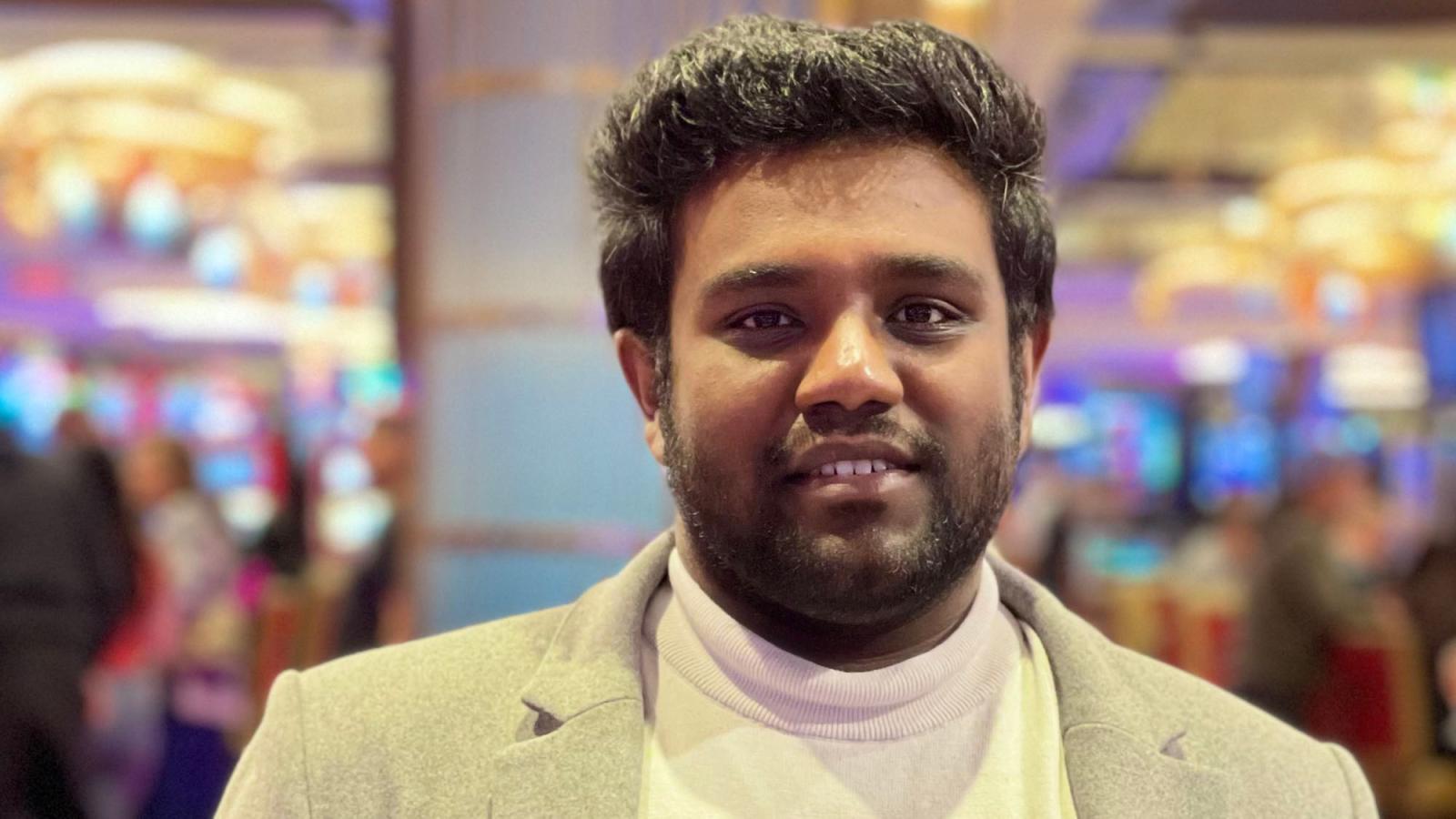
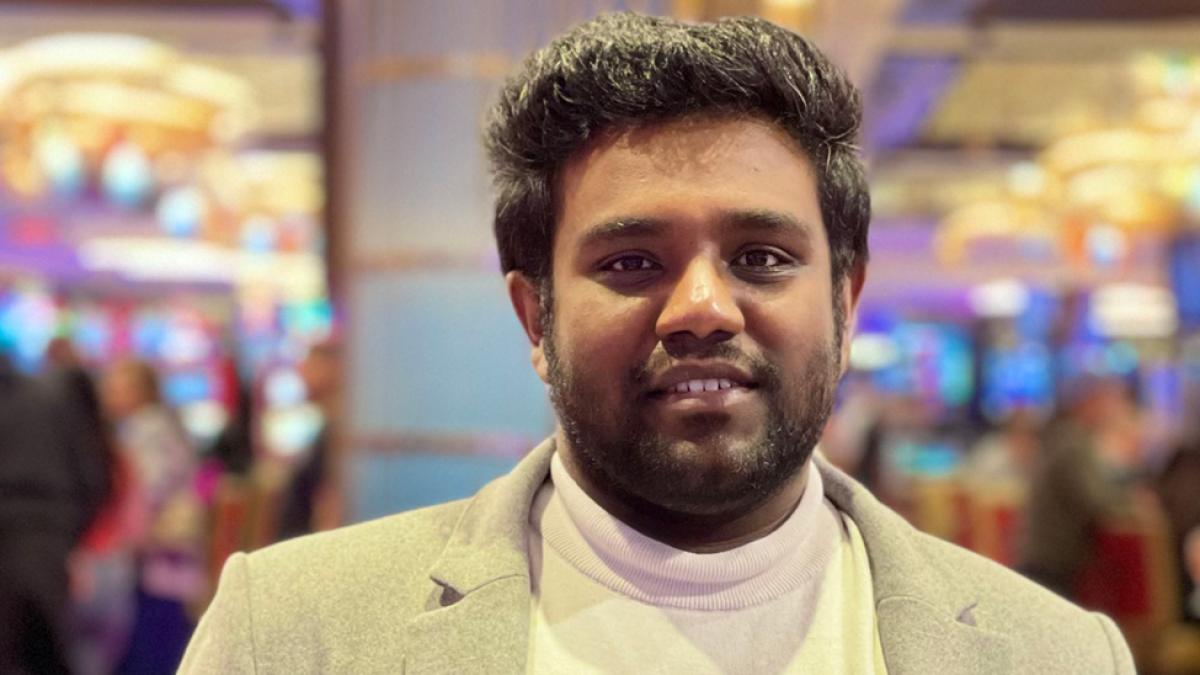
Sri Nikhil Racha ’22 has had his share of challenges—and he’s hungry for more.
In Fall 2020, Racha started master’s in Computer Science on Pace’s New York City Campus. He expected the challenge inherent with any master’s program but had not anticipated the added difficulty of learning during COVID-19, especially as an international student. What’s more, because of a personal loss, he soon found himself travelling between New York City and his home in India, navigating drastically different time zones, ever-changing health and safety mandates, and rising expenses in an uncertain economy.
“At one point, I wanted to drop out, to be honest,” he admits. However, in a moment where his future was the most uncertain, one of his professors, Seidenberg’s Pauline Mosley, PhD, rose to the occasion. “She was the one who pushed me, supported me, and raised my morale. Pace has given me a lot, not just the studies or the education. I never expected a professor to come out of nowhere and support me.”

Mosley’s push of support set Racha back on track and he soon found himself diving deeper into Pace life, recounting particular excitement at a capstone project that integrated business learning—prompting him to consider an eventual return to Pace for business school. Without the help of his professor, he might not have ever considered business school. What’s more, “I would not be here,” he explains. “I’d be in India. It’d be a whole different story.”
But as of now, his story is looking much more thrilling, as he’s just accepted a job with one of the biggest tech companies worldwide—Amazon. He’s starting at a higher level, as a Level IV Software Development Engineer, working on some exciting new features that will radically change the way people shop. (Of course, he couldn’t go into much detail—you’ll just have to wait and see).
Amazon was especially appealing because of his interest in Cloud development, and at the prospect of working not only with the back-end development but also front-end user interfaces. But more than anything, Racha was hungry for the challenge. Outlining the prospect of contending with Amazon’s high standards and strict work principles, he said, “If you can survive at Amazon, you can survive anywhere. That’s what everyone says.”
"Pace has given me a lot, not just the studies or the education."
Amazon wasn’t his only option, however. Right from the start, Racha wanted to give credit where credit was due—to the extra services Pace provides, especially when it came to resume building. “My resume got picked by all the companies,” he explains. “Facebook, Google, Amazon, Bloomberg. Whatever the University is doing when it comes to resume proofing and the resume tailoring workshop, it’s really good.” Laughing, he adds, “Literally, other students from other universities are actually asking for my help with their resumes.”
His parting words to other students ring full of self-determination. He calls on students to make their own luck, drive their own education, and remember why they wanted to get an education in the first place. “Just stick to it, that’s it. Try as much as you can.” And most importantly when challenges arise, “Don’t give up.”
More from Pace
Both in the classroom and on the court, Naya Rivera ’22 has shown that the desire to change things for the better—and simply putting yourself out there—can truly go a long way.
Meet Lubin student Aishna Kumar '22, a Pforzheimer Honors College student originally from Japan, who studied abroad in Barcelona, landed a dream internship at Nike, and took on a leadership role in Pace's chapter of the American Marketing Association.
Nursing student Kalin Tang '22 traveled around the world and found herself at Pace University’s Lienhard School of Nursing. Kalin and her family lived in countries like Hong Kong, Korea, and Thailand, and also in several states throughout the United States.
Grainne McGinley and the Heart of Giving
Grainne McGinley was voted by her peers and faculty to address the College of Health Professions at Commencement 2022. At the heart of her journey as a first-generation college student is the spirit of service.
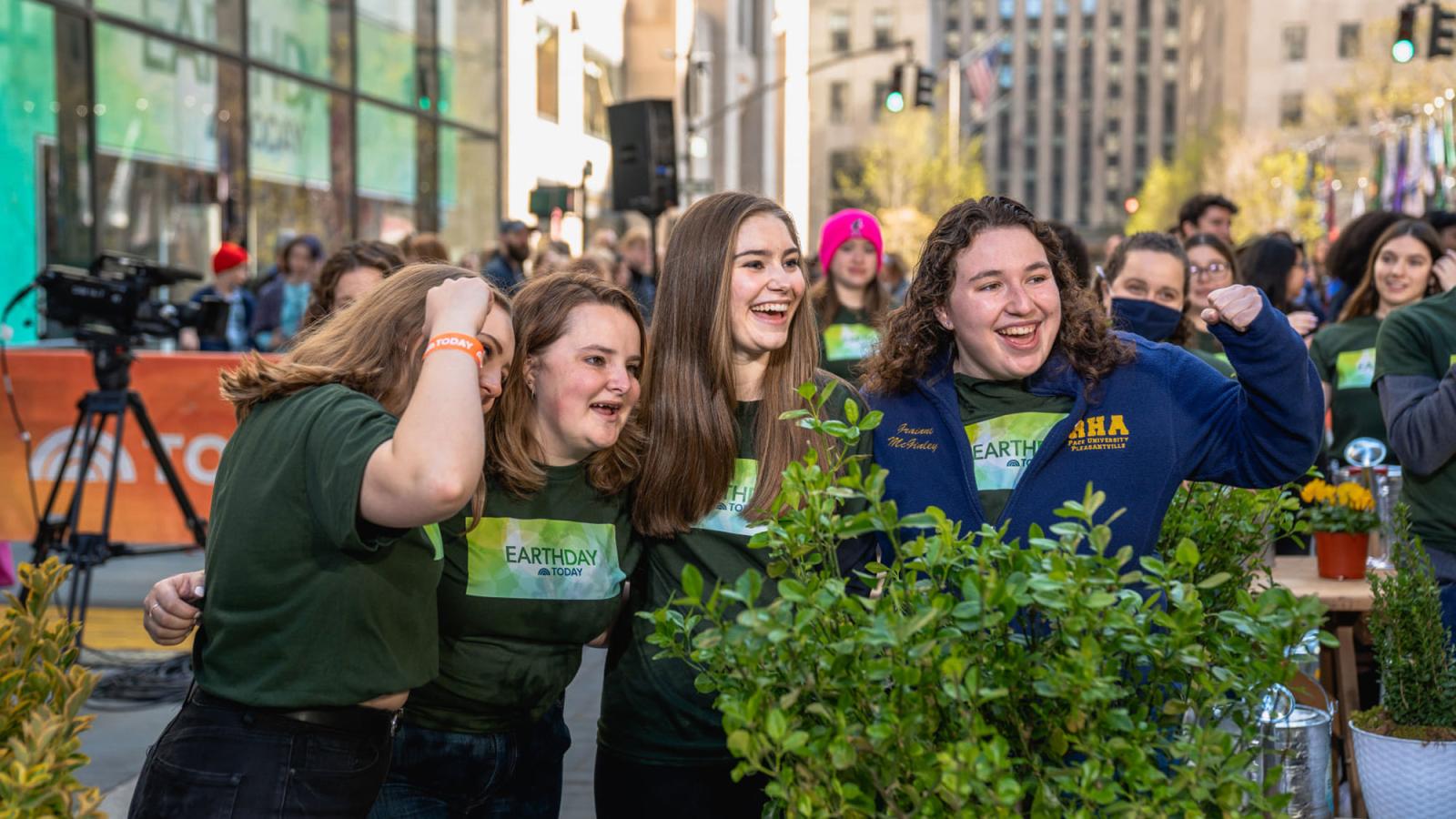
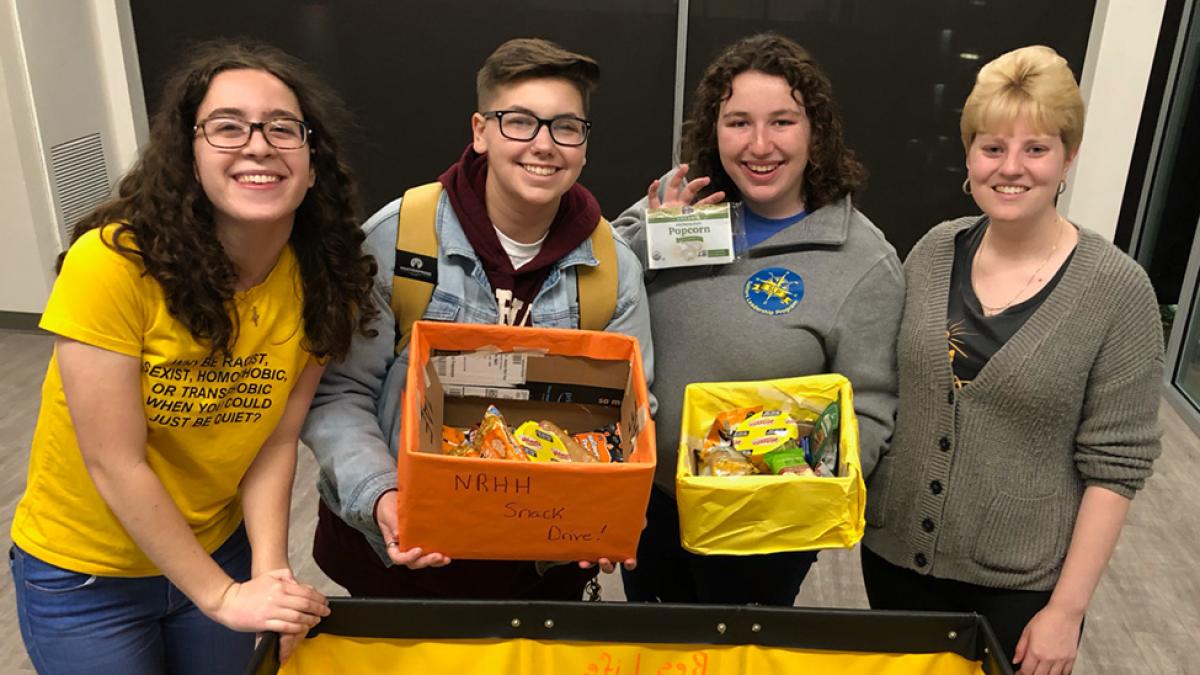
Go-Getters are set apart for their resilience through challenges, turning knowledge into action, and service to their community. Who better exemplifies those qualities than Grainne McGinley?
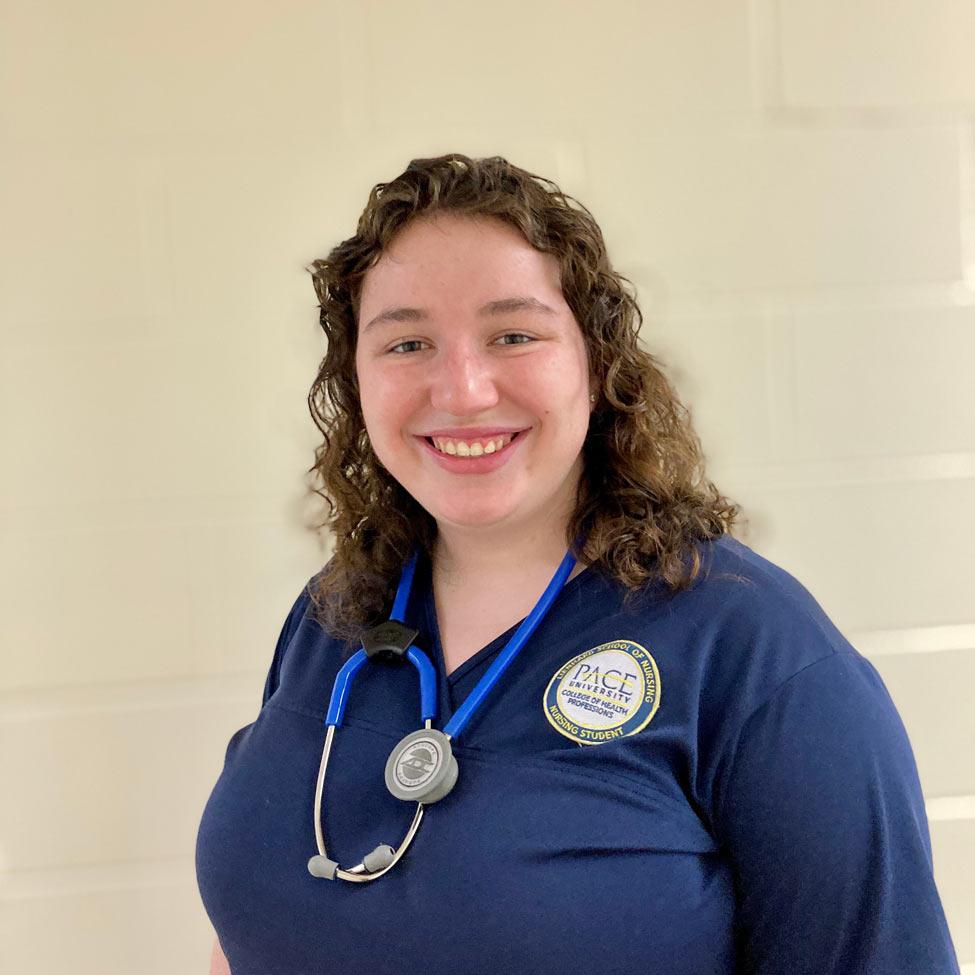
Grainne McGinley ’22 is a College of Health Professions nursing major on the Pleasantville Campus well-known for her dedication to service. A Jefferson Award winner and member of Gamma Sigma Sigma National Service Sorority, she’s committed the sparse free time she has to charitable work—from local animal shelters, to food banks, to overseas mission trips. (Seriously, we can’t list everything she’s done, but check out a sampling of some of her community service here!)
Her love for volunteering, and her passion for care, both stem from an injury when she was young. At the age of three, a kettle-related burn injury threw her into the path of a volunteer ambulance corps, and their care stuck with her. She explains, “When I turned of age, I made sure to start volunteering with the people who saved my life and the lives of so many others, and I became a medical assistant with the ambulance corps.”
“When I turned of age, I made sure to start volunteering with the people who saved my life and the lives of so many others."
When she arrived on Pace’s Pleasantville Campus, she already had a growing passion for healthcare, especially cardiovascular health. In her second year, she realized that only one third of the campus had access to Automatic External Defibrillators (AED), lifesaving medical equipment. She partnered with the Student Government Association and has added 11 new AEDs to date.
But she didn’t stop there. She currently works as an emergency room technician at Greenwich Hospital and White Plains Hospital, where she has seen firsthand how, in her words, “CPR and access to proper medical equipment and health education has saved so many people’s lives.”
More often than not, tireless helpers like McGinley work behind the scenes with little recognition, but her peers and faculty were so inspired by her work ethic that they voted for her to speak at Commencement. “It was a big surprise to me,” she says. “I’m really excited to have that honor to have some final remarks and share it to those who impacted me along the way here.”
"I’ve really had the opportunity to grow into a new person, and into the experiences I wanted to have.”
At the time of this interview, she’s still working on her speech, but she keeps bringing it back to ideas of working together, chasing opportunities, and making a difference. In other words, Opportunitas.
When asked what Opportunitas means to her, Grainne reflects, “I’m a first-generation college student. The opportunity that I’ve had to come to Pace and not only further my education but to build those connections, with my friends, with the faculty, my future clinical science employers—I’ve really had the opportunity to grow into a new person, and into the experiences I wanted to have.”
McGinley’s plans for after Commencement? You can bet on continued community service, as she’s on her final steps to securing a license as a CPR instructor and hopes to bring CPR training to her local community. She has final nursing exams to pass and then hopes to continue working in local hospitals, hopefully in an ICU burn unit. With as much as she’s already given, she’s hopeful to give even more. “I would love the opportunity to work with people in that moment that they need the most help.”
More from Pace
Nursing student Kalin Tang '22 traveled around the world and found herself at Pace University’s Lienhard School of Nursing. Kalin and her family lived in countries like Hong Kong, Korea, and Thailand, and also in several states throughout the United States.
"You're empowered to create your own experience, to tailor it around the impact that you want to make here on campus," says Film and Screen Studies student Justin Winley. "I'm building a community that I can draw on even after I graduate."
Meet Lubin student Aishna Kumar '22, a Pforzheimer Honors College student originally from Japan, who studied abroad in Barcelona, landed a dream internship at Nike, and took on a leadership role in Pace's chapter of the American Marketing Association.
May 2022: A Message from President Krislov
President Krislov shares his excitement about the biggest Commencement ceremony in Pace history—celebrating three class years across six schools and colleges and from all three Pace campuses. It will be a day to remember.
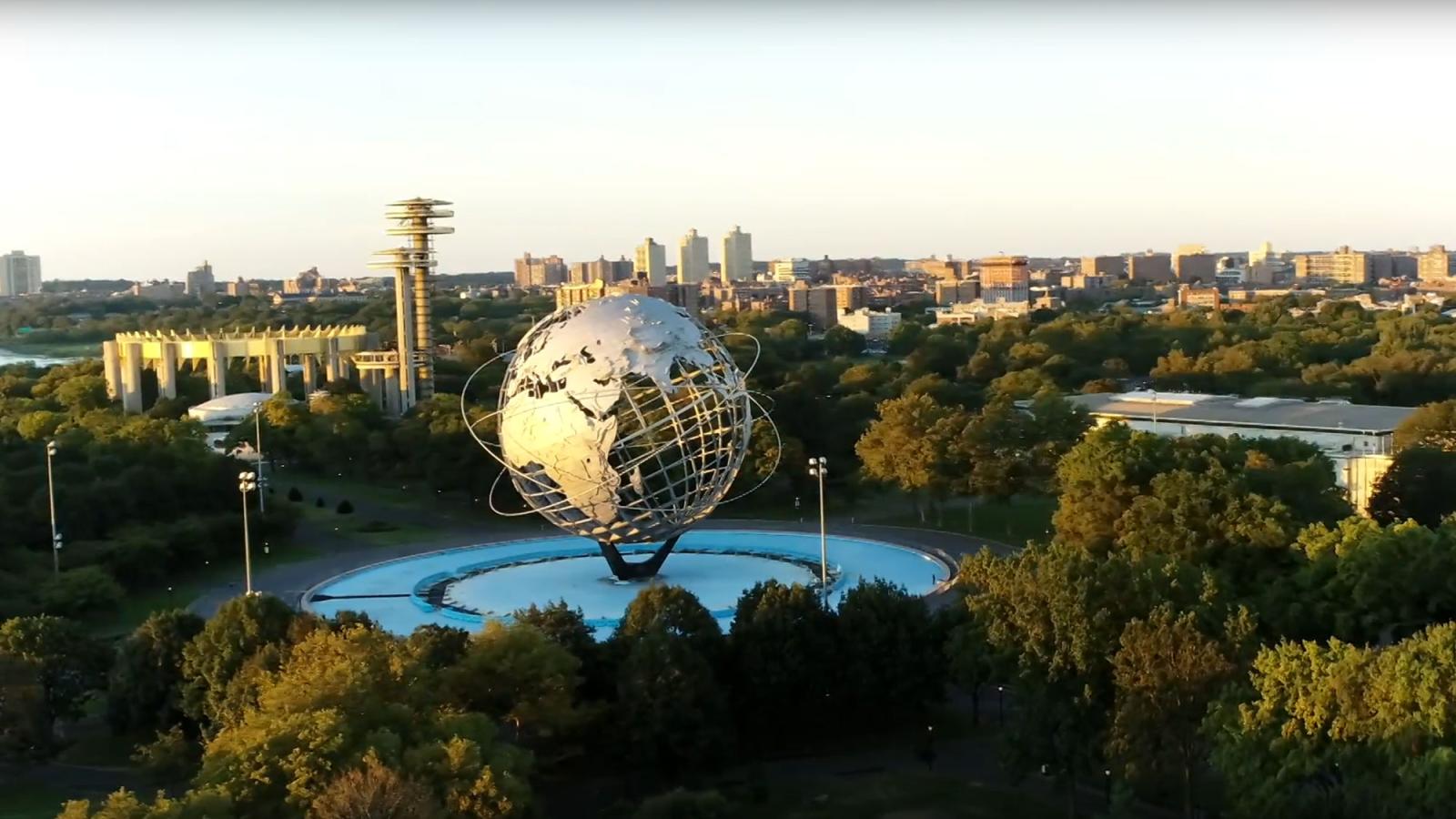
Twelve days.
That’s the current countdown to Commencement, and the Pace Community couldn’t be more excited.
This year’s Commencement will be big. It’s our first in-person celebration in three years. It’s the first time we’re bringing all our graduates, from all levels—and across our three campuses and six colleges and schools—together for one major event. And it’s the first time we’ll be celebrating three graduating classes, the remarkable classes of 2020, 2021, and 2022.
The day will be an extraordinary celebration of our students—I’m hoping it’s a bright and sunny day, giving all of these amazing students the best opportunity to shine. College is always a challenging period, and graduate school even tougher, but these three classes have persevered through what is probably the most challenging period in all of our lifetimes. Graduating students, you are committed, you are resilient, and you’re about to walk across a stage and receive your diplomas. Congratulations. I couldn’t be prouder.
I want to salute the organizers, who have been working hard all year to plan this special day. I want to salute the faculty and staff who have guided these students through their studies. And I want to salute the parents, family, and friends who have supported them—especially over two years when support was so crucial and necessary.
I hope I’ll see many of you at the USTA Billie Jean King National Tennis Center on Monday, May 16, as we celebrate these graduates and their accomplishments. I’m pleased that we’ll have such a prominent group of speakers to help us celebrate that special day.
I can’t wait to see you there as we cheer on all our graduates.
The Business of Growing
Connor Morgan '21 discovered a talent for videography by accident when he was asked to film a wedding video as a last-minute fill-in during his senior year of high school. Now one year since graduation from Pace, he's expanded his business to the West Coast and is working with big names in the industry
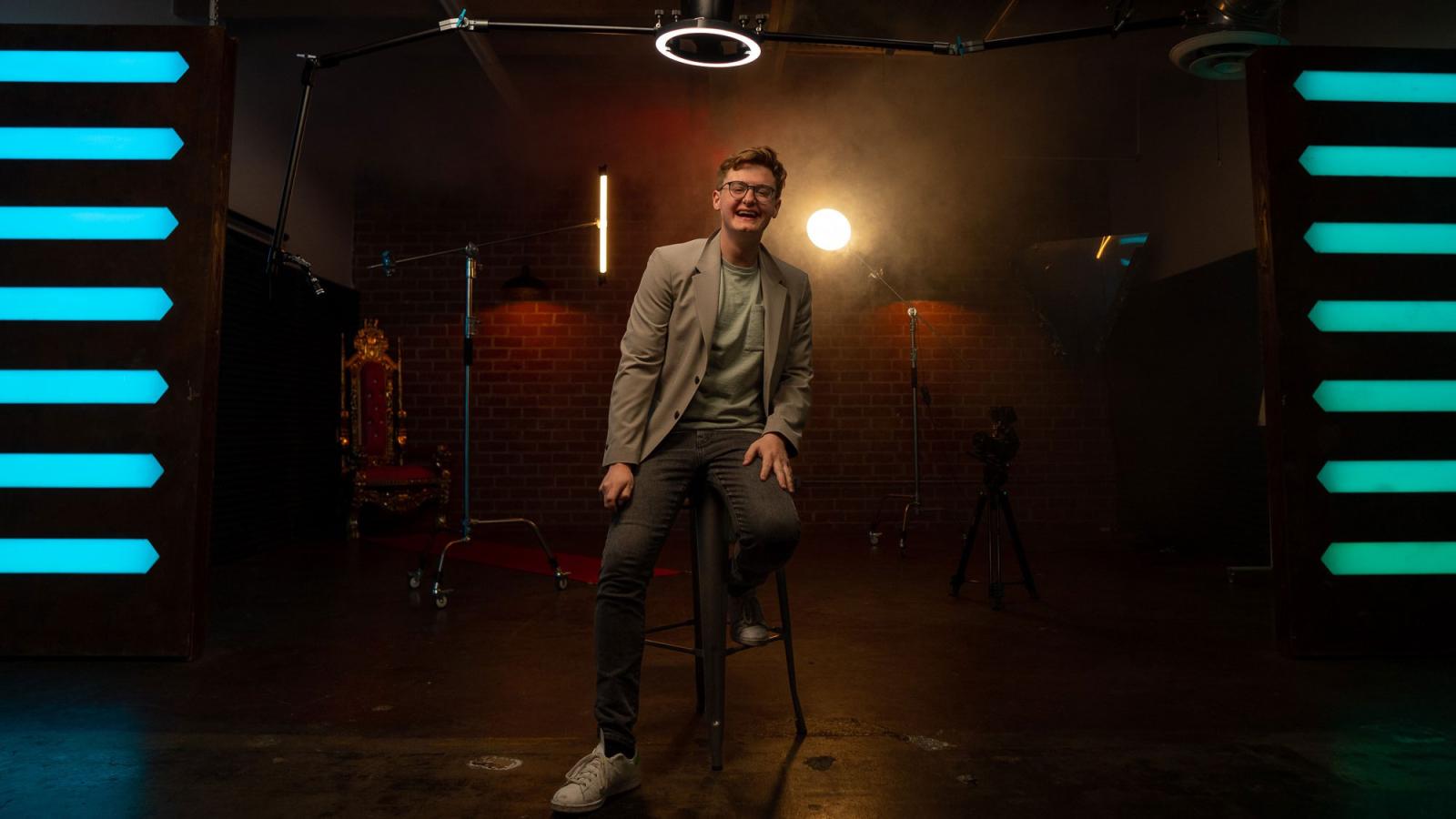

Connor Morgan was never a big fan of school. “When I was in high school, I wasn’t a great student—didn’t do the homework.” But don’t take that to mean that Connor isn’t a hard worker. His senior year, he became a business owner. “My teacher needed someone to video a wedding at the last minute, so I said sure. Then I filled in for another wedding videographer who got into an accident before a shoot. It wasn’t until wedding three that I figured I had something.”
From there, Eighteen Mile Media was born. And ignited an entrepreneurial spirit Connor never knew he had.
But being a student and an entrepreneur isn’t easy. “My freshman year at Pace, things really took off, and I was juggling going to school with running the business. I almost left. But being in the supportive Pace Community helped me get out of the burnout.” Connor was blown away by both the community and the drive of Pace people. “Everyone seemed like they were happy to be there, not just going through the motions to get a piece of paper. Pace students are constantly learning and finding a way to make a really great future for ourselves. It’s infectious.” On top of his classes and the videography business, Connor took on becoming a Pace Orientation Leader for the summer and fostered some deep friendships along the way.
“Pace students are constantly learning and finding a way to make a really great future for ourselves. It’s infectious.”
And Connor didn’t just find a supportive academic community at Pace—he also found support for his business that helped him grow as an entrepreneur and a person. “When the new president took office, I filmed the video that introduced him to the school. That opened the door to the commercial world.” Since then, Connor has shot several videos for Pace University and has fostered close relationships with the staff and administration. “I just spoke at my high school’s career day—I showed my first video, and then my most recent video, and the students were amazed to see the difference. I’ve seen how much growth has come out of this. Pace gave me the opportunity to grow from real professional experience.”
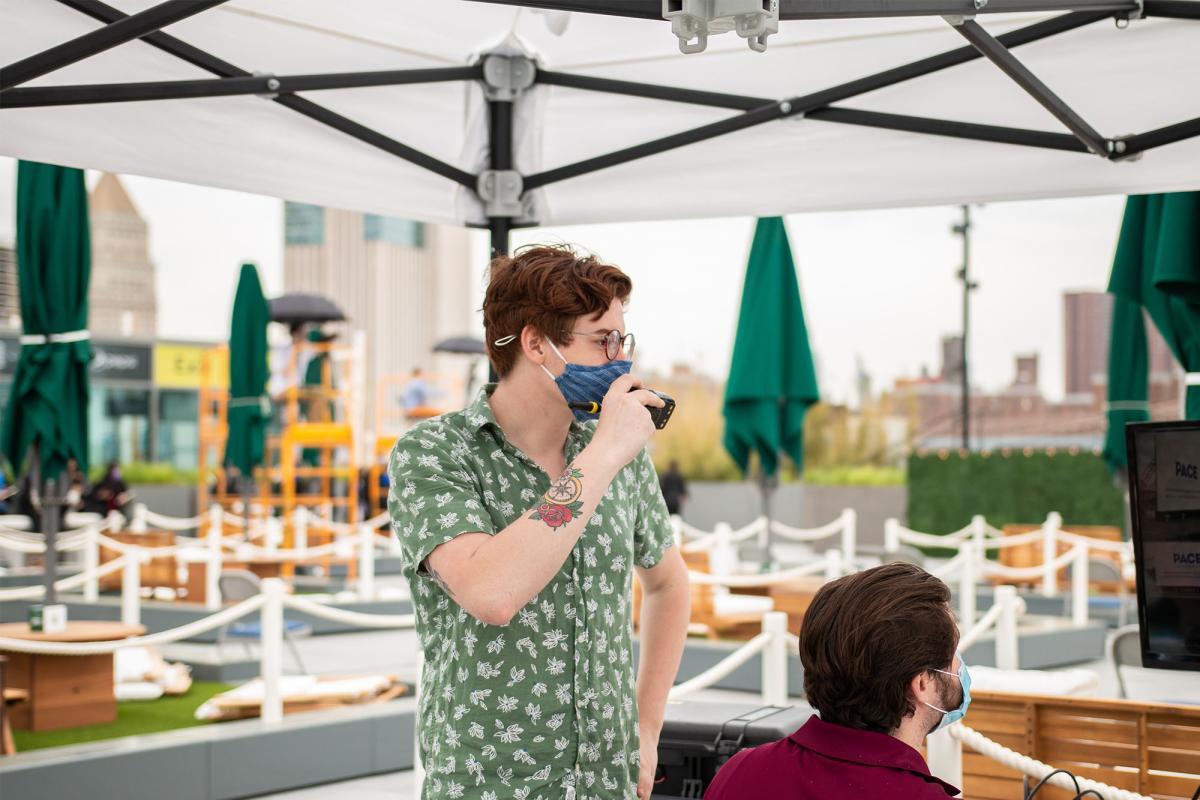
And Connor’s opportunities have only multiplied. In 2019, Hillary Clinton paid a visit to Pace, and Connor was the only available photographer on campus. So, they called him up to cover it. “She reposted my photo on her Instagram, and my watermark was on the photo. It was amazing!” In 2021, he was invited to be part of the audio team for the halftime show at Super Bowl LIV in Miami. “Even though I wasn’t there with a camera, it was awesome to watch the camera crews and see the amount of prep work that goes into the event. I had to miss a week of school to make it there, but my professors at Pace were so supportive and wanted me to take advantage of the opportunity.”
Connor knows his story isn’t conventional, but what he loves so much about Pace is that they were able to meet him where he was and show him that he determines what makes a great college student experience. In 2020, and again in 2021, Connor recorded and produced Pace’s Commencement ceremony, an experience that he says kick-started his interest in live-to-tape broadcasts.
“I think I might be the only person in the world who can say they made their own graduation on this scale,” he says, thinking back on the mix of in-person and virtual components during Commencement 2021. He was calling the shots behind the camera and crossed the stage all in the same day. Amazingly, that experience helped him land another gig with the NFL. “I was there for all of Super Bowl week and I’m there—the youngest person by far—with 15 major NFL players and everyone seemed really impressed with the skills I gained from doing graduation at Pace.” He produced Taste of the NFL, which premiered Super Bowl Sunday.
In the year since graduation, Connor has moved to Los Angeles where he’s branched out 18 Mile Media doing live event and commercial work, in addition to managing a group of individual content creators with 1M+ YouTube subscribers. “I made my own future,” he says. “Pace helped me get there.”
Law experts disagree over whether Raymond Snyder can be retried for murder
Haub Law’s Bennett Gershman provides insights to The Daily Freeman about whether a certain murder case can be retried.
The 'Ghost of Kyiv' was never alive, Ukrainian air force says
Adam G. Klein, associate professor of communication studies at Pace University's New York City campus, said it's important to realize that Ukrainian soldiers and citizens are fighting a Russian military eight times larger
